HS2: costs and controversies
How much has the HS2 project cost since its inception?
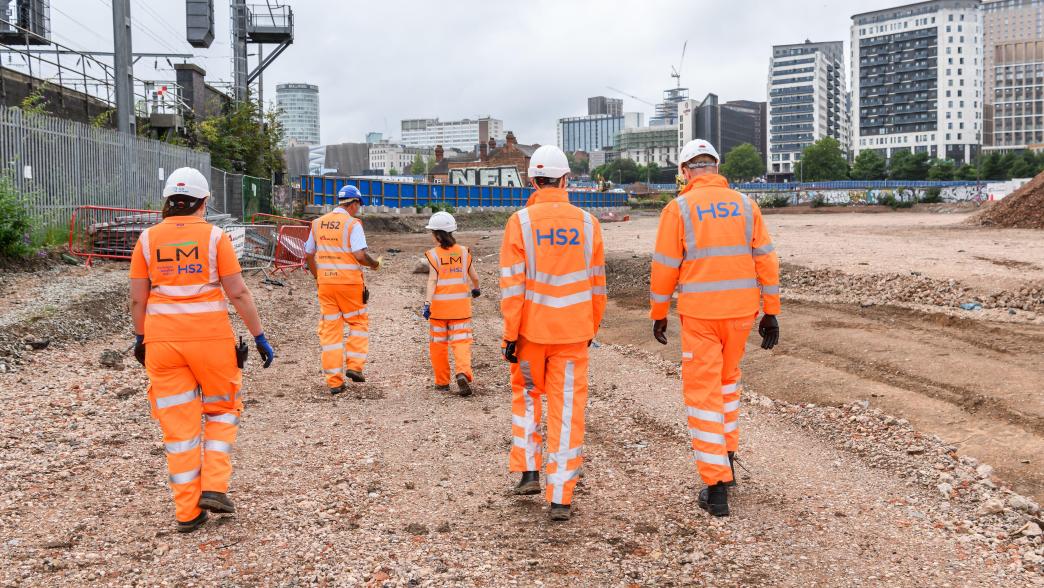
What is HS2?
High Speed 2 – more commonly known as HS2 – was conceived in 2009 as a scheme to build a high-speed railway between London and the north of England, providing a catalyst for regional economic regeneration and growth.
40
Cook A, HS2 Chairman’s Stocktake, HS2 Ltd, 3 September 2019, https://assets.publishing.service.gov.uk/government/uploads/system/uploads/attachment_data/file/850408/hs2-chairmans-stocktake.pdf
Construction was originally planned in phases: ‘Phase 1’, between London and Birmingham; ‘Phase 2a’, between Birmingham and Crewe; and ‘Phase 2b’, between Crewe and Manchester.
The scheme has been become controversial due to delays, cost increases and, more recently, decisions from central government to scrap sections of the line. In November 2021, a separate arm of the line originally proposed to link Birmingham and Leeds was removed from the plan. 41 Department for Transport, Integrated Rail Plan for the North and Midlands, CP 490, The Stationery Office, 2021, https://assets.publishing.service.gov.uk/government/uploads/system/uploads/attachment_data/file/1062161/integrated-rail-plan-for-the-north-and-midlan… Then in October 2023 Rishi Sunak used his party conference speech – in Manchester – to announce that the government was also cancelling the Birmingham to Manchester leg.
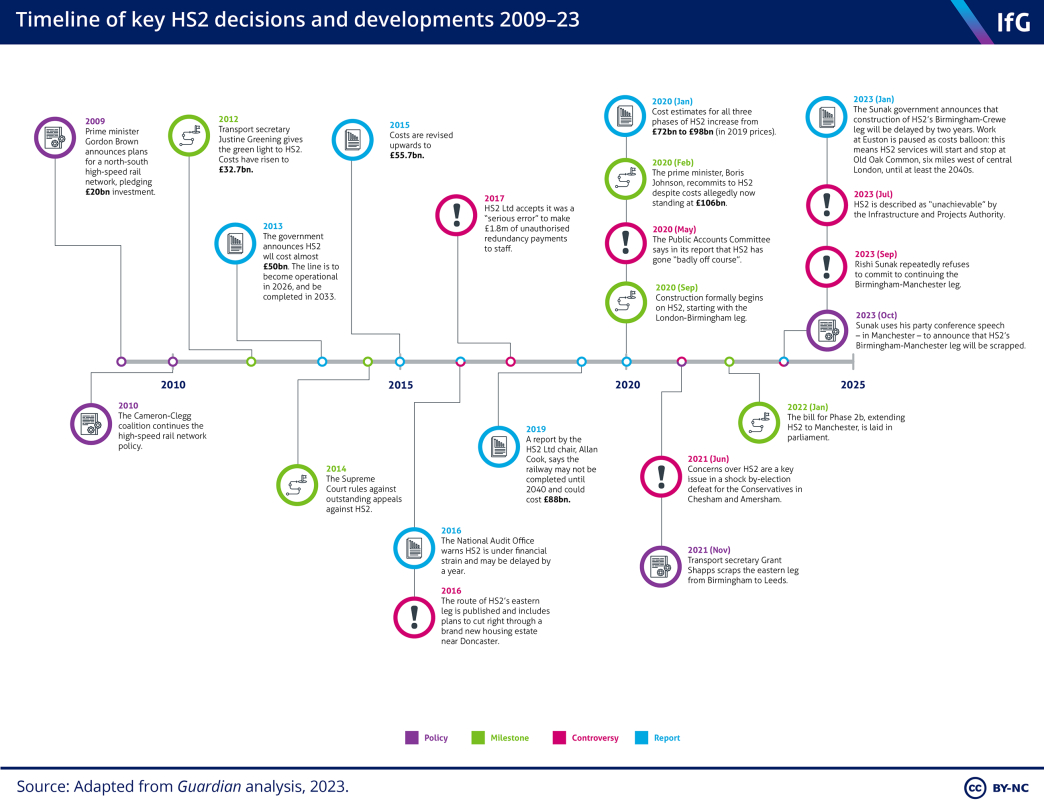
How much will HS2 cost?
The Gordon Brown Labour government initially estimated that HS2 would cost £37.5bn (in 2009 prices) but the expected cost has since increased dramatically.
Between 2011 and 2013, the cost of HS2 rose by £12.6bn in cash terms: including £7.5bn for rolling stock not previously costed and an additional £5.1bn on construction of the line. Estimates from HS2 Ltd., the non-departmental public body set up to manage the project, fell between 2015 and 2017 on the basis of assumed efficiencies, 42 Haylen A and Bennett O, High Speed 2: the business case, costs and spending, House of Commons Library briefing paper CBP 8601, 26 June 2019, https://researchbriefings.files.parliament.uk/documents/CBP-8601/CBP-8601.pdf including reducing the costs of property acquisition, getting contractors to deliver more efficiently, and reducing overhead costs – but these efficiencies were not found.
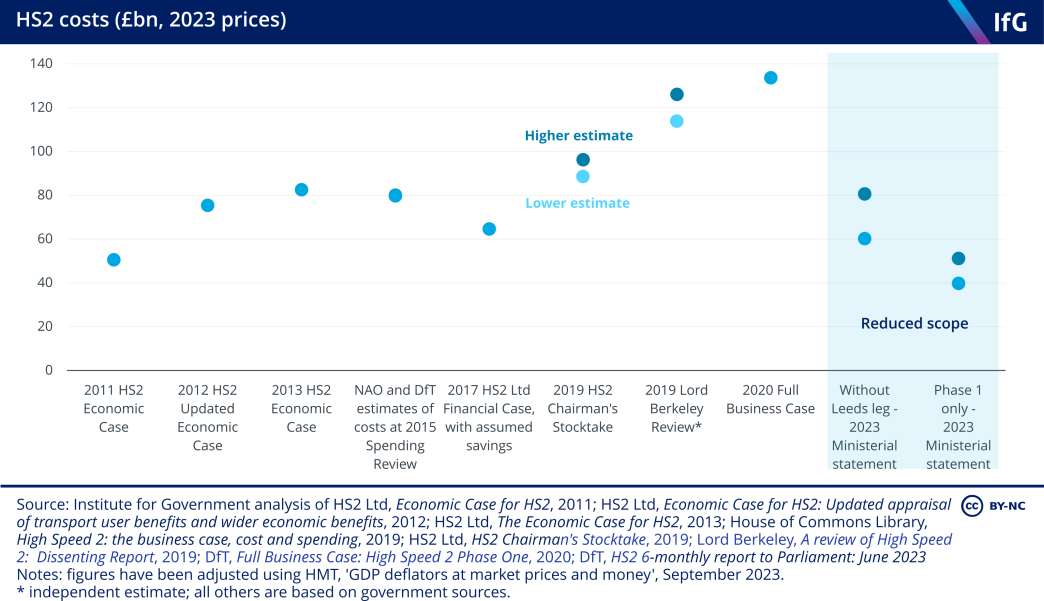
A 2019 review of the project, conducted by HS2’s chairman, Allan Cook, suggested that the final costs would be between £72.1 and £78.4bn (in 2015 prices) reflecting the “scale and complexity of the programme”, and admitting early estimates were “overly optimistic”. 43 Cook A, HS2 Chairman’s Stocktake, HS2 Ltd, 3 September 2019, https://assets.publishing.service.gov.uk/government/uploads/system/uploads/attachment_data/file/850408/hs2-chairmans-stocktake.pdf
The Oakervee Review, commissioned by the government in 2019 to inform the Notice to Proceed decision for Phase 1, did not re-examine the estimated cost of the programme, instead relying on findings from an internal ‘Chairman’s Stocktake’ published earlier that year. 44 Oakervee D, Oakervee Review of HS2, 11 February 2020, https://assets.publishing.service.gov.uk/government/uploads/system/uploads/attachment_data/file/870092/oakervee-review.pdf The review’s deputy chair, Lord Berkeley, published a dissenting report which argued that the final costs of HS2 would be £100–110bn (2015 prices) 45 Lord Berkeley, A Review of High Speed 2: Dissenting Report, 5 January 2020, https://acrobat.adobe.com/link/review?uri=urn%3Aaaid%3Ascds%3AUS%3A8e9c8f87-2650-4aa0-8e0f-0eaf6e709640 based on previous underestimates of the cost of purchasing land, maintenance, redeveloping Euston station, and further contingencies.
The full business case for Phase 1 of HS2, published in April 2020, gave a cost of £35–45bn, framing the estimate as a range to reflect the uncertainty over such a complex programme and driving the total forecast cost up to £108.9bn (2015 prices). 46 Department for Transport, Full Business Case High Speed Rail Phase 1: Moving Britain Ahead, 2020, https://assets.publishing.service.gov.uk/media/5fc51d7b8fa8f54755392863/full-business-case-hs2-phase-one.pdf
The cancellation of the connection to Leeds led to a reduction in forecast cost to £53–71bn (2019 prices), higher than the projections in 2013 despite the significant reduction in scope.
The further abandonment of Phase 2 limits the total estimated spend to £35-45bn (2019 prices) on Phase 1, plus the £2.2bn sunk costs already incurred on the cancelled stages.
How much has HS2 cost so far?
Construction of Phase 1 started in September 2020. By February 2023, a total of £24.7bn had been spent, of which £22.5bn had been spent on Phase 1. 53 Department for Transport, HS2 6-monthly report to Parliament: June 2023, 19 June 2023, retrieved 26 September 2023, www.gov.uk/government/speeches/hs2-6-monthly-report-to-parliament-june-2023
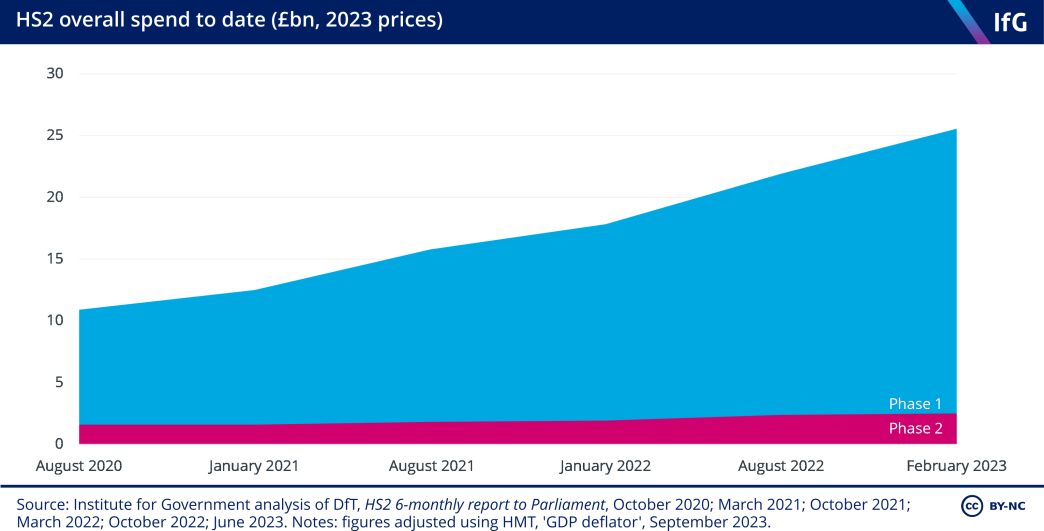
Why have costs risen?
There are four main reasons behind the drastic rise in costs of the HS2 project.
- Scope changes: the scope of HS2 expanded after its original announcement, with changes to the original plans driving increased cost.
54
[1] Comptroller and Auditor General, High Speed Two: A progress update, Session 2019-20, HC 40, National Audit Office, 2020, www.nao.org.uk/wp-content/uploads/2020/01/High-Speed-Two-A-progress-update.pdf
For example, during the passage of the hybrid bill to approve the first phase of the line, political pressure from protestors and constituents led MPs to vote to lengthen the tunnel through the Chilterns. 55 Wolmar C, ‘Why is HS2 costing so much?’, The Spectator, 27 August 2023, retrieved 26 September 2023, www.spectator.co.uk/article/why-is-hs2-costing-so-much HS2 Ltd. estimate that scope changes accounted for £1bn of the £20–26bn increase between 2017 and 2019. - Ground conditions: estimates rose sharply as construction companies began developing detailed designs for the project. For instance, engineers discovered that ground conditions were poorer than HS2 Ltd. had expected, necessitating more structural work before laying the tracks. The cost of civil engineering for Phase 1 rose £5bn between 2017 and 2019, accounting for almost half of the cost increase on this part of the line.
- Inflation: the rise in prices and labour costs since the early estimates has had a ‘significant’ effect on planned costs. 56 Plimmer G, Pickard J, Fray K and Williams J, ‘HS2 costs set to jump as inflation undermines rail project’s future’, Financial Times, 20 September 2023, retrieved 26 September 2023, www.ft.com/content/9caa662c-40b1-47f1-ba4a-1a500df119ab
- Optimism bias: the government was too optimistic about how cheaply and quickly it could build HS2. This was shown in HS2 Ltd. adding less than half the contingency that Crossrail kept during its early development stages.
Will costs rise further?
It is likely that costs will rise again for the remaining phases of HS2. Delaying the completion of some elements, such as the finishing the line to London Euston (current plans have trains temporarily starting and finishing at Old Oak Common six miles short of the eventual terminus), could see costs rise due to inflation. This will be on top of further cost increases such as maintenance of the partially constructed sites. 57 House of Commons, Hansard, Vol. 729, Col. 697, 14 March 2023
The cancellation of Phase 2 reduces the scope for further overspend, although the extent of liability for existing contractual commitments is unclear at this stage.
The government has recognised the cause of earlier cost increases and attempted to address these issues through improving risk provision, challenging third-party costs and value-engineering for savings within the specification. 58 Department for Transport, Full Business Case High Speed Rail Phase 1: Moving Britain Ahead, 2020, https://assets.publishing.service.gov.uk/media/5fc51d7b8fa8f54755392863/full-business-case-hs2-phase-one.pdf
Does HS2 provide value for money?
As costs have increased, the government’s projections of HS2’s benefit–cost ratio (BCR, the value of the economic, social and environmental benefits delivered for each pound of public money invested) have fallen.
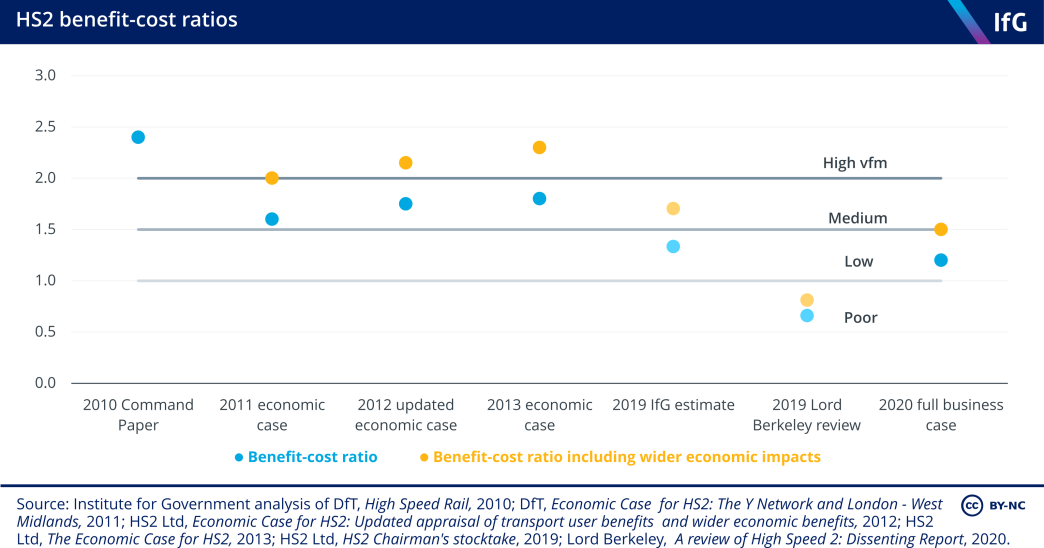
Initially estimated as delivering £2.40 of benefit for each pound of public money spent, the government had revised the BCR down to 1.8 in 2013
62
HS2 Ltd, The Economic Case for HS2: Summary of key changes to the Economic Case since August 2012, October 2013, https://assets.publishing.service.gov.uk/government/uploads/system/uploads/attachment_data/file/365072/S_A_7_Summary_of_key_changes_since_August_2012…
– returning ‘medium’ value-for-money, according to the government’s guidance on transport investments.
63
Department for Transport, Value for Money Framework, 20 July 2017, https://assets.publishing.service.gov.uk/government/uploads/system/uploads/attachment_data/file/918479/value-for-money-framework.pdf
Lord Berkeley estimated that HS2 would only deliver £0.66 for each public pound spent, predicting both higher costs – at £22bn more than the 2019 Chairman’s stocktake – significantly reduced benefit from both passenger demand and train frequency, and less ambitious predictions of economic growth.
The 2020 full business case stated the BCR of the overall programme as 1.5 – just achieving the standard for ‘medium’ value-for-money. Phase 1 on its own was graded as ‘low’ value-for-money, with a BCR of 1.2. The incremental benefits of Phase 2b had showed the greatest return with a BCR of 1.8, again graded as ‘medium’ value-for-money.
The cancellation of Phase 2 was attributed to the changes in the benefits assumptions in the light of train usage after the pandemic, with a fall of the BCR to 0.8 indicating a ‘poor’ value-for-money return.
64
Department for Transport, ‘PM redirects HS2 funding to revolutionise transport across the North and Midlands’, press release, 4 October 2023, retrieved 4 October 2023, www.gov.uk/government/news/pm-redirects-hs2-funding-to-revolutionise-transport-across-the-north-and-midlands
- Political party
- Conservative
- Administration
- Sunak government
- Public figures
- Rishi Sunak
- Publisher
- Institute for Government